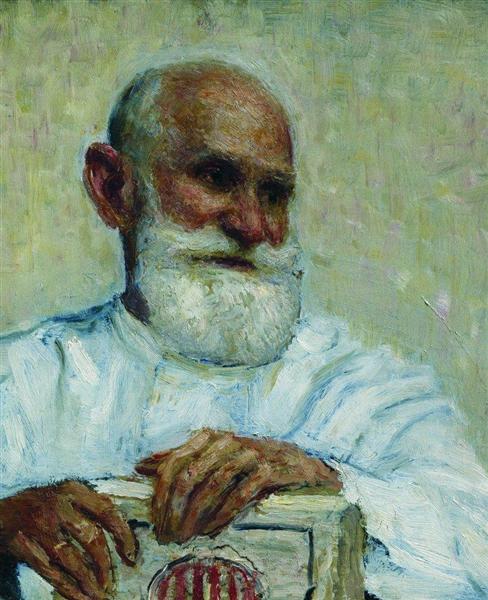תיאור
In 1924, Ilya Repin, one of the most prominent painters of 19th-century Russia, painted the Portrait of the Physiologist Ivan Petrovich Pavlov, a work that not only represents a prominent scientist, but also a mastery in capturing the human essence through portraiture. This work is set in the context of a Russia in transition, having experienced the turbulence of the October Revolution, and reflects art's search for new meanings in a changing world.
The composition of the portrait is notable for its balance and its focus on the central figure, Pavlov’s face, which becomes the axis around which the entire work revolves. Repin captures the deep, thoughtful gaze of Pavlov, a scientist known for his studies on classical conditioning. The physiological expression, mixed with concentration and serenity, reveals something of his character: a man dedicated and passionate about his work, but also about understanding human behavior. This expression is a crucial aspect that Repin emphasizes, giving the viewer a glimpse into the mind behind discoveries that have influenced diverse fields, from psychology to medicine.
The treatment of colour in the painting is rich and nuanced. Repin uses a palette of subtle, earthy tones, which reinforce the seriousness of the character. The light falls softly on Pavlov's face, creating a beautiful contrast with the background, where dark tones can be perceived. This play of light and shadow is characteristic of Repin's style, who managed to convey the three-dimensionality and texture of the skin through a careful use of chiaroscuro, a technique that allows the anatomy and gravity of the subject to be highlighted.
On closer inspection, one can see how Pavlov's clothing, a simple suit, is devoid of elaborate embellishment, reflecting his humble position, as opposed to the grandeur often expected of portraits of eminent figures. This deliberate approach suggests that Repin is not only seeking to pay homage to the man, but is also making a comment on the nature of true scientific work: essentially austere and focused on the pursuit of knowledge.
An interesting element in the portrait is the setting. Although the background is dark, the choice to leave it undefined allows the viewer to focus on Pavlov. This technique is also a late signature of the Impressionism that Repin had mastered in his career. Although his style evolves and adapts, this portrait shows a fusion of the Russian tradition with Western Impressionism, making it a particularly rich work.
Certainly, Ilya Repin, known for his mastery of portraiture and pictorial narrative, was also a pioneer in capturing the psychology of his subjects. In the Portrait of the Physiologist Ivan Petrovich Pavlov, he manages to convey not just the image of a man, but the essence of a thought and a discovery that has endured over time. This work, though less well-known than other portraits of historical figures such as his famous “The Cossacks Writing a Letter to the Sultan of Turkey,” remains a testament to the depth of Repin’s ability to bridge humanity with science. Just as Pavlov changed the field of physiology, so too Repin redefined what portraiture can be, taking us beyond mere representation into the realm of introspection and genuine expression.
KUADROS ©, a famous painting on your wall.
Hand-made oil painting reproductions, with the quality of professional artists and the distinctive seal of KUADROS ©.
Painting reproduction service with satisfaction guarantee. If you are not completely satisfied with the replica of your painting, we will refund 100% of your money.

